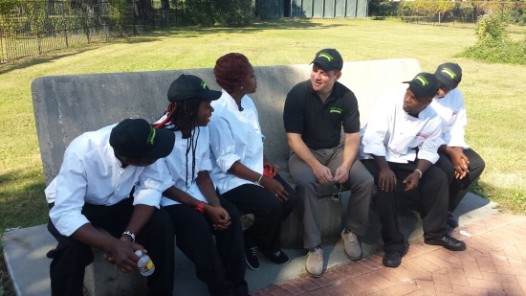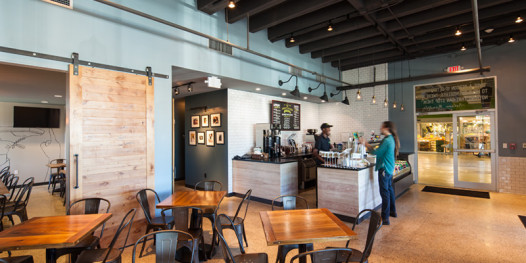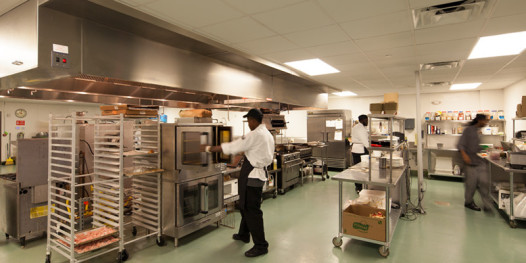
Liberty’s Kitchen director David Emond talks with students. (Photo: libertyskitchen.org)
The entire first site of Liberty’s Kitchen – all 1,800 square feet of the ground floor of a nearby raised cottage — would fit into the kitchen alone of its new 10,000-square-foot digs next door to the Whole Foods market on Broad Street. But its physical growth is modest compared to the exponential way this organization’s dreams are growing.
Liberty’s Kitchen was created in 2009 to provide culinary training and life skills to New Orleans at-risk youth. The group soon added a school nutrition component to the program, and now provides about 4,000 made-from-scratch meals to a trio of charter schools in the city.
But Liberty’s Kitchen leaders hope to do a lot more with a recent $1.2 million injection of funds from Baptist Community Ministries, the Conrad N. Hilton Foundation and Methodist Health System Foundation. The grants will allow them to operate a multiyear Healthy Futures Initiative for local schools, as well as augment training for their own students.
It’s an opportunity that director David Emond hopes will have far-reaching consequences for New Orleans students and their families.
“It encompasses everything we do, but adds the lens of health and wellness,” he says. “We’ll take a more farm-to-fork approach in the culinary training, and stress healthy strategies in personal life.
“In this neighborhood, if you cross Broad Street from that side to this side, your life expectancy goes down by 20 years. We’re impacting more than individual kids. It’s also about energizing communities.”

Students get front-of-the-house experience at Liberty’s Cafe. (Photo: libertyskitchen.org)
Every little bit they do goes a long way, Emond says. Of the youth who come to them, 70 percent have experienced trauma or abuse, 62 percent face chronic homelessness and 39 percent are raising children themselves.
“Half of our students don’t finish the program on their first try,” he says. “But we don’t measure success by who finishes. Each kid gains so much by being here for even a month.
Of those who do graduate, 70 percent have retained jobs or gotten promotions after one year.
The 12-week training course at Liberty’s Kitchen is fairly intense. It begins with three weeks of life skills tutoring, from personal finances to self-confidence. Students keep journals, and plan individual visions for their futures.
They then spend time in the complex’s spacious kitchen, where, after daily culinary lessons, they practice what they learn in one of several businesses. Liberty’s Kitchen operates a catering arm, produces seven food items for sale at Whole Foods, runs Liberty’s Kitchen Café and Coffee House (supported by Starbucks), and provides breakfast, lunch, snacks and sometimes take-home dinners to the 1,300 students in all of the New Orleans College Prep charter schools. Trainees get hands-on practice at everything from chopping vegetables to cash register management.

The cutting-edge kitchen would be the envy of most restaurant chefs. (Photo: libertyskitchen.org)
Almost 400 students have graduated from Liberty’s Kitchen since its inception. It will train about 100 students this year, but with the Healthy Futures Initiative, Emond hopes that number will increase to 135 next year, and 160 the year after.
The program is open to anyone between ages 16 and 24 who is out of work and out of school, Emond says. The aim is not only to teach marketable skills, but also to turn what some have called “dislocated youth” into what he thinks of as “opportunity youth.” The Liberty’s Kitchen location is no accident: Co-founder Janet Davas selected the first site for its view of the courthouse, and young people coming out of jail there.
One thing the new initiative will enable them to do, Emond says, is continue mentoring graduates once they leave Liberty’s Kitchen. Each will be placed in a four-week externship after graduation, and a proposed new youth center will give them a place to return to for counseling and troubleshooting concerns.
“We can add an additional eight months when they are encouraged to return and interact with everyone here,” Emond explains. “We want to be a safety net for them – that’s one of the main reasons for the externships. This may well be the first place our students have ever felt welcomed and loved. We start with a hug.”

Student taste tests are among tactics used to hone nutrition awareness. (Photo: libertyskitchen.org)
In the school cafeteria arena, Liberty’s Kitchen starts with student health and expands from there.
“The vast majority of students get most of their food at school,” Emond says. “We hope to change the culture of eating at home, too, with things like family meal nights. Our goal is to double our output of school meals, to 8,500 a day, over the next three years.”
While most of those meals will be prepared onsite by a professional staff, Liberty’s Kitchen students help with the prep work. The most important thing they teach, says Emond, are kitchen knife skills.
In another new initiative, Liberty’s Kitchen is teaming up with nine other local partners – including other established youth programs like Café Reconcile – to build a software platform that tracks all of their progress. The idea is to share resources and results, so that all can broaden their impact.
“The first 10 years after Katrina has been about people responding,” Emond says. “The next 10 years will be about collaborating.”
 NOLAbeings Multimedia artist Claire Bangser created NOLAbeings as a portrait-based story project that marries...
NOLAbeings Multimedia artist Claire Bangser created NOLAbeings as a portrait-based story project that marries...  Voodoo in New Orleans: Reviving history: New Orleans fortune telling This article takes a deep dive into the history of Voodoo in New Orleans, its hybridization with Catholicism, and its present-day place in the city's culture. The author visits fortune-tellers in the French Quarter, using their guidance as a tool for introspection rather than a deterministic predictor of the future. Through her experiences in New Orleans, the author feels a mystical connection to both the past and the future.
Voodoo in New Orleans: Reviving history: New Orleans fortune telling This article takes a deep dive into the history of Voodoo in New Orleans, its hybridization with Catholicism, and its present-day place in the city's culture. The author visits fortune-tellers in the French Quarter, using their guidance as a tool for introspection rather than a deterministic predictor of the future. Through her experiences in New Orleans, the author feels a mystical connection to both the past and the future. 